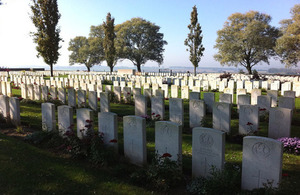First World War Centenary: advice for travellers
Advice for a trouble free visit to First World War Centenary Commemorations.

Messines Ridge Cemetary, G Matheson
Overview
With so many events due to take place in Commonwealth War Grave sites and other areas across Europe, the Foreign and Commonwealth Office has collated some useful travel advice to make planning your trip easier. Some locations will become extremely busy at certain times of the year, and some may have access restrictions. Check out our information and further details on linked sites to discover all you will need to know to ensure your trip is safe and trouble free.
Specific advice for commemorations
Before travelling to a commemoration site or event we encourage all travellers to:
- do your research before you go – some sites will be closed for private ceremonies or for cemetery maintenance; the Commonwealth War Graves Commission (CWGC) website has more information on dates and locations
- be aware that unexploded ammunition can still be found in the battlegrounds – do not touch or pick anything up if you are not sure what it is
- be aware that the roads around commemoration sites will be busy and possibly congested – pay extra care while driving and make sure you familiarise yourself with the local driving laws and customs before you travel - please see our tips on driving in France
- be prepared for warm weather conditions – carry plenty of drinking water and items such as sun cream or a sun hat to protect yourself from the sun
- tune in to local radio while driving to catch weather and traffic reports
General advice for travelling in Europe
Some things to bear in mind when travelling in Europe:
- check that your passport is valid for the duration of your trip
- keep your passport somewhere safe – take a photocopy of the details page and consider storing this information on a secure online data storage site
- remember that the number for emergency services throughout Europe is 112 – store this in your phone
- carry your European Health Insurance Card (EHIC) – this proves your entitlement to reduced cost healthcare if you need medical attention
- the EHIC does not cover the entire cost of hospitalisation, and it does not cover repatriation should that become necessary; take out comprehensive travel insurance before you travel and be sure to declare any pre-existing medical conditions
Gallipoli
Access to the majority of the Gallipoli Peninsula on 24-25 April 2015 will be limited to those in possession of a ticket for the ceremonies. The ballot to attend Anzac Day commemorations at Gallipoli in 2015 has been drawn and all successful applicants have been notified.
Turkey is not part of the EHIC scheme and the 112 emergency services number is for Ambulances only. Use 155 to contact the Police in an emergency.
Useful links
Check out our country specific travel advice for up to date information on the countries you are planning to visit.
You can get your free EHIC card by visiting the NHS travel site
If you are looking for information on WW2 commemoration events, see our advice on the 70th anniversary of the D-Day landings in Normandy), which includes information on obtaining accreditation for veterans.
If you are travelling to France, the French Government’s commemorations site has useful information available in English.
The following Belgian sites contain information about the centenary commemorations in English:
Brussels First World War Website
Belgian Federal Government First World War Website
Wallonia First World War Website (in French)
Further information
Like UKinBelgium on Facebook and follow UKinBelgium on Twitter
Like UK inTurkey on Facebook and follow UKinTurkey on Twitter
Follow British in France on Twitter